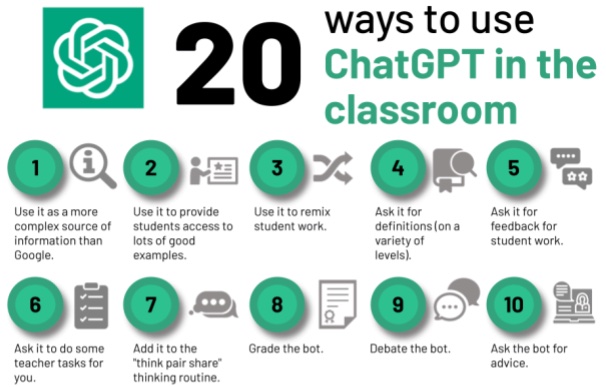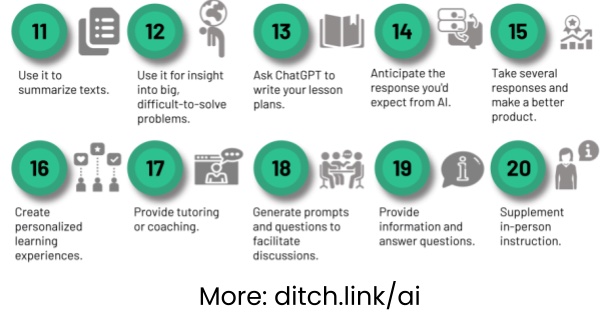The FETC conference is going on right now in New Orleans and sadly, the conference has a paltry online offering. A couple of the presenters are publishing their slides, including Matt Miller at Ditch That Textbook, who is giving a number of presentations and has made all of his slides openly available online. His ChatGPT sessions are especially popular.
? #FETC breaking news?
— Matt Miller #FETC ⚜️ (@jmattmiller) January 24, 2023
We are presenting our ChatGPT sessions AGAIN due to high demand!
ChatGPT, AI and EDU
?me, @HollyClarkEdu and @k_shelton
⌚4pm CST
?Location TBA in the FETC app
Resources: https://t.co/sXgbuHytWN and https://t.co/M64u9mA1Yv pic.twitter.com/RxSdO96PvW
We have previously talked about ChatGPT, but for some background, it is an AI Chatbot that has been very successfully writing paragraphs and essays that are harder to distinguish from human writing than previous AI text generators. ChatGPT has passed tests for medical licenses and business degrees, and it has even been listed as a co-author in at least four scientific papers and has likely ghost authored many more. With these developments, how will homework based on essays survive?
The short answer is it probably won’t and it probably shouldn’t. Unlike a lot of hyperbolic think pieces in larger publications, Miller is taking a very calm view of ChatGPT. He points out that many technologies, starting with calculators and including Google and Wikipedia have been initially banned by teachers out of fear.
But the ban doesn’t last. Calculators are expected on most math and science AP tests (although the type of calculator is controlled) and wikipedia is considered an important starting place for a lot of research (if still a substandard source). Most importantly, Miller calls on us to rethink what we consider to be copying and cheating. The AI technology students have at their fingertips is already impressive and it is only going to get better.
Matt pointed out that if you substitute the word friend for AI in the previous slide, most teachers would be less likely to call many of the possibilities cheating.
Matt Miller also had 20 great ideas about how to use ChatGPT in the classroom


While a lot of this is unique and ambitious ideas for how teachers can use ChatGPT in the classroom, the actual result will probably be a lot more pedestrian. As much as we have “adapted” to calculators in the classroom in 2023, there are still plenty of kids who go home and have to do multiplication homework. As much as we have adapted to wikipedia, there are still plenty of kids who go home and copy essays off of it.
Dr. Vince Carbino said that “plagiarism is not an integrity issue, it is a time management issue” and that is largely true for other forms of cheating too. Students who know they can google a textbook and find answers to all the problem sets have been doing that for a decade and the landscape of homework has changed very little.
ChatGPT will be another tool in the toolkit of the middle 50% of students who want to find shortcuts to their essays, and teachers will continue to use services like Turnitin.com to catch some of them. Super engaged teachers will find ways to integrate it as Miller has suggested, just as super engaged teachers find ways to encourage students to edit and add to wikipedia articles.
The only way to really control what resources a student uses is to have sterile testing conditions for things like APs and SATs, and those situations are some of the most biased and the least like situations that a student is likely to actually encounter in the workplace.
Likely some of the biggest users of ChatGPT will be textbook authors or anyone else who has to produce pages and pages of text that doesn’t need to be enthralling. Which make’s NYC’s decision to ban teachers from accessing it more of a win for companies trying to sell content than for teachers and students.
More Stories
A Boomer’s view of Student Debt
Student loan forgiveness has been in the news again recently with the White House announcing $5.8b additional student loan debt...
Tutoring as a part of teaching / Everything comes back to money
One of the difficult things with education is our reliance on a “one size fits all” model. We have for...
Justin Reich on Learning Loss, Subtraction in Action, and a future with much more disrupted schooling
Justin Reich is an education and technology researcher and the director of MIT’s Teaching Systems Lab. He hosts a podcast...
Public K-12 Enrollment is falling and that is dangerous and exciting
A surprising result of COVID and the resulting school closures is that many parents, after struggling to figure out how...
Esports could help re-diversify a shrunken curriculum
Esports and schools feel like a pretty strange fit. Regular sports have always gone with schools, but adding esports still...
People aren’t flipping out for flipped classrooms like they used to
Flipped learning, a new strategy for teaching that flips the traditional idea of classroom lecture followed by homework on its...
